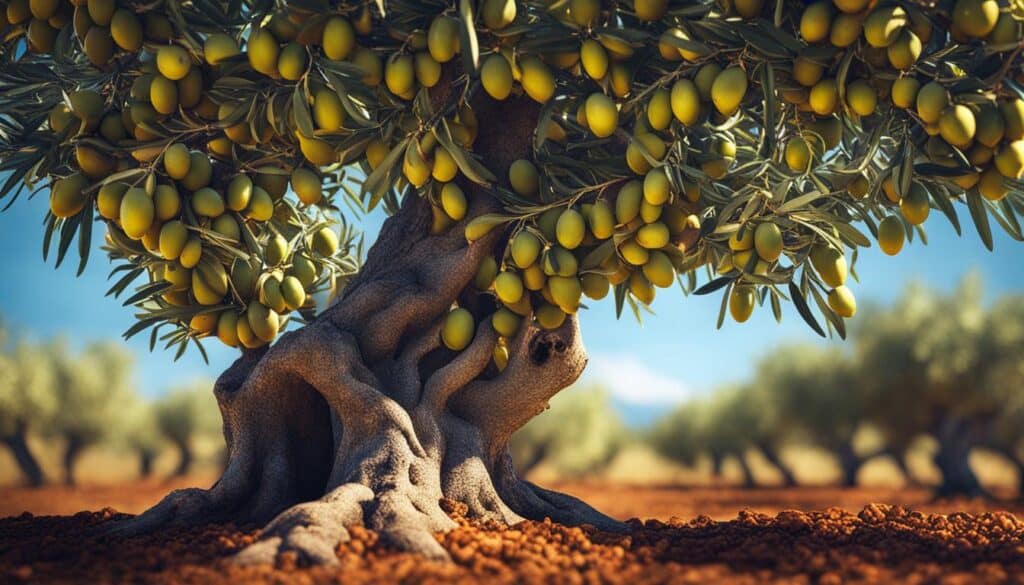Hey there! Welcome to a journey of discovery where we explore the wonders of olive fruit. Join me as we delve into the incredible benefits, nutritional value, and fascinating history of this versatile and cherished fruit.
Did you know that olive trees have been cultivated for over 4,000 years, originating in Turkey and spreading throughout the Mediterranean? Olive fruit not only provides food but also serves as a source of medicines and nourishing creams. And let’s not forget about the star of the show – olive oil, derived from the olives themselves, which has found its way into both culinary and cosmetic applications.
You may have heard of the Mediterranean diet, which places a heavy emphasis on consuming olive oil. This diet has been linked to numerous health benefits, including improved cardiovascular health and a reduced risk of certain diseases. Truly, the magical properties of olive fruit know no bounds!
Key Takeaways:
- Olive fruit has a rich history dating back thousands of years in the Mediterranean region.
- Olive oil, derived from olives, is used widely in both cooking and skincare.
- The Mediterranean diet, high in olive oil consumption, offers various health benefits.
- Olive fruit is a nutritious food, packed with healthy fats, fiber, and essential vitamins and minerals.
- Embracing the magic of olive fruit can enhance both our well-being and our appreciation for nature’s wonders.
The Culinary Uses of Olive Fruit
Olive fruit is not only delicious, but it also adds a unique flavor and texture to a variety of dishes in Mediterranean cuisine. Whether you prefer the boldness of black olives or the tanginess of green olives, there are numerous ways to incorporate this versatile fruit into your meals.
Types of Olive Fruit:
| Type | Description |
|---|---|
| Green Olives | These olives are harvested before they fully ripen, resulting in their bright green color and slightly bitter taste. They are commonly used in salads and as a topping for pizzas. |
| Black Olives | Black olives are left to fully ripen on the tree before being harvested. They have a milder flavor and are often used in pasta dishes, tapenades, and as a garnish for soups. |
Aside from enjoying olives as they are, they can also be stuffed with various ingredients to add an extra burst of flavor. Common fillings include cheese, garlic, almonds, and peppers. These stuffed olives make for an impressive appetizer or a perfect addition to a charcuterie board.
Additionally, olive oil, which is extracted from the fruit, is a staple ingredient in Mediterranean cooking. Its rich and smooth flavor enhances both savory and sweet dishes. It can be used for sautéing vegetables, marinating meats, dressing salads, and even baking. Its versatility is truly remarkable.
From classic Greek salads to hearty pasta dishes and homemade hummus, olive fruit brings a burst of Mediterranean flavor to your table. Experimenting with different olive varieties and incorporating them into your recipes will surely elevate your culinary creations.
Health Benefits of Olive Fruit

Olive fruit and its oil offer a myriad of health benefits. Packed with antioxidants and anti-inflammatory compounds, consuming olive fruit can have a positive impact on overall well-being. Here are some key health benefits associated with olive fruit:
1. Cardiovascular Health
Olive fruit has been linked to improved cardiovascular health. The monounsaturated fats found in olive oil can help lower bad cholesterol levels and reduce the risk of heart disease. Additionally, the antioxidants in olive fruit can reduce inflammation and oxidative stress, promoting heart health.
2. Brain Health
Olive oil, a derivative of olive fruit, has been shown to have beneficial effects on brain function. It contains polyphenols, which have been associated with improved cognitive function and a reduced risk of cognitive decline and neurodegenerative diseases like Alzheimer’s.
3. Anti-Cancer Properties
Compounds found in olive fruit, such as phenols, have been found to have antimicrobial and anti-cancer properties. These compounds can help protect against various types of cancers, including breast, colorectal, and prostate cancer. The consumption of olive fruit can be a valuable addition to a cancer-preventive diet.
| Health Benefit | Explanation |
|---|---|
| Cardiovascular Health | Olive fruit can help lower bad cholesterol levels, reduce inflammation, and promote heart health. |
| Brain Health | The polyphenols in olive oil can improve cognitive function and decrease the risk of cognitive decline. |
| Anti-Cancer Properties | Compounds in olive fruit have antimicrobial and anti-cancer properties, offering protection against certain types of cancer. |
“Olive fruit and its oil offer a multitude of health benefits, including improved cardiovascular health, enhanced brain function, and potential cancer prevention.”
Incorporating olive fruit into your diet can be a simple and enjoyable way to reap these health benefits. Whether you consume olives as a snack, use olive oil for cooking, or incorporate it into salad dressings, you can harness the power of olive fruit to support your well-being.
The Nutritional Value of Olive Fruit
Olive fruit is not only delicious but also packed with essential nutrients that contribute to a healthy diet. Here is a breakdown of the nutritional value of olive fruit:
| Nutrient | Amount per 100g |
|---|---|
| Calories | 115 |
| Total Fat | 10.5g |
| Saturated Fat | 1.42g |
| Monounsaturated Fat | 7.89g |
| Polyunsaturated Fat | 0.92g |
| Carbohydrates | 6g |
| Fiber | 3.2g |
| Protein | 0.8g |
| Vitamin E | 1.65mg |
| Iron | 0.49mg |
| Calcium | 88mg |
Olive fruit is a great source of healthy fats, including monounsaturated fats, which are known to promote heart health and help lower bad cholesterol levels. These healthy fats also aid in the absorption of fat-soluble vitamins, such as Vitamin E. Speaking of which, olive fruit is a good source of Vitamin E, an antioxidant that protects cells from damage caused by free radicals.
In addition to its healthy fat content, olive fruit is also low in calories and carbohydrates, making it a suitable choice for those watching their weight or following a low-carb diet. Its high fiber content contributes to a feeling of fullness and aids in digestion.
Furthermore, olive fruit contains important minerals like iron and calcium, which are essential for maintaining healthy bones and preventing conditions such as osteoporosis. These minerals, along with other nutrients found in olive fruit, contribute to overall well-being and support various bodily functions.
Growing Olive Fruit

When it comes to growing olive fruit, there are a few key factors to consider in order to ensure optimal growth and a fruitful harvest. Olive trees thrive in a Mediterranean-like climate with mild winters and hot summers, making them well-suited for regions with similar conditions. Countries like Spain, Italy, Greece, and Turkey are renowned for their olive production, with Spain being the largest producer worldwide.
Propagation is typically done through seeds or cuttings, with cuttings being the preferred method for desired cultivars. Olive trees require well-drained soil, so it’s important to ensure that the planting location has proper drainage. They also need plenty of sunlight, so choosing a sunny spot in the garden is ideal.
Olive trees have a long lifespan and can live for hundreds of years, making them a long-term investment for those looking to cultivate their own fruit. With proper care and maintenance, including regular pruning to shape the tree and remove dead or damaged branches, olive trees can provide a bountiful harvest year after year.
The process of growing olive fruit requires patience and the right conditions, but the rewards are well worth it. Whether you’re a seasoned gardener or a beginner looking to try your hand at growing your own food, cultivating olive trees can be an exciting and rewarding experience.
Table: Olive Tree Varieties
| Variety | Origin | Characteristics |
|---|---|---|
| Arbequina | Spain | Small, fruity olives; suitable for both oil production and table olives |
| Kalamata | Greece | Large, purple-black olives; famous for their rich flavor and use in Greek cuisine |
| Leccino | Italy | Medium-sized olives; known for their mild, buttery flavor; commonly used in olive oil production |
| Manzanilla | Spain | Medium-sized, green olives; popular for both table olives and olive oil production |
| Picholine | France | Large, green olives; prized for their crisp texture and use in martinis |
Table: Olive Tree Varieties showcasing different types of olives and their characteristics.
The Symbolism of Olive Trees

In many cultures throughout history, olive trees and their branches have held powerful symbolic meanings. The olive tree has long been associated with peace and harmony, often representing hope and renewal. Its branches have been used as symbols of victory and achievement, signifying the end of conflict and the beginning of a new era.
Olive trees have also been seen as symbols of endurance and longevity, as they can live for hundreds of years, weathering both time and challenges. Their deep roots represent stability and strength, grounding them firmly to the earth. The olive tree’s ability to thrive in harsh conditions further symbolizes resilience and adaptability.
In ancient traditions and religious ceremonies, olive branches were often used as emblems of faith and purification. They were seen as a source of divine blessings, offering protection and healing to those who encountered them. The olive tree’s connection to spirituality and divine energy has made it a powerful symbol of connection between the earthly and the divine.
“The olive tree is a symbol of peace and harmony, reminding us of the beauty that can arise from unity and understanding.” – Unknown
The Significance of Olive Trees in Greek Mythology
In Greek mythology, the olive tree held special significance, particularly in relation to Hecate, the goddess of magic and witchcraft. Hecate was often depicted holding torches, which were believed to guide people through the darkness and provide protection. Olive trees and olive oil were sacred to Hecate, as they were believed to possess magical properties and were used in rituals and offerings to honor her.
The symbolism of olive trees extends beyond mythology and ancient traditions. Today, they continue to be cherished as powerful symbols of peace, resilience, and connection. The enduring presence of olive trees in various cultures serves as a reminder of the profound impact nature can have on our lives and the timeless wisdom it holds.
Table: Symbolism of Olive Trees in Different Cultures
| Culture | Symbolic Meaning |
|---|---|
| Greek | Peace, magic, guidance |
| Christian | Hope, renewal, purity |
| Roman | Victory, fertility, strength |
| Jewish | Divine blessings, spiritual connection |
| Mediterranean | Endurance, resilience, abundance |
The Historical Significance of Olive Fruit

The history of olive fruit is deeply intertwined with the civilizations of the Mediterranean, where it has been cultivated and treasured for thousands of years. Ancient olive trees and their fruit played a significant role in the daily lives and cultural practices of these societies, leaving a lasting legacy that continues to be celebrated today.
One of the most remarkable aspects of olive fruit is its ability to withstand the test of time. Some ancient olive trees that still bear fruit today are believed to be hundreds, and in some cases, even thousands of years old. These majestic trees, with their gnarled trunks and twisting branches, serve as living witnesses to the eras gone by and the stories they hold.
Olive Fruit in Ancient Egypt
Ancient Egypt, known for its rich history and mystique, also had a deep appreciation for olive fruit. Olive oil was highly valued and used for various purposes, from cooking to skincare. In fact, olive branches were found in the tombs of pharaohs, symbolizing their belief in the afterlife and the importance of olive fruit in their journey beyond.
Furthermore, olive trees were seen as a symbol of prosperity and fertility in ancient Egypt. They were often planted in temple gardens and honored as a sacred tree, connecting the earthly realm with the divine. The olive fruit itself was considered a symbol of abundance and goodness, offering nourishment and vitality to those who partook of its treasures.
Today, the historical significance of olive fruit can still be felt and appreciated. It continues to be a staple ingredient in Mediterranean cuisine, embodying centuries of tradition and cultural heritage. The ancient olive trees that bear witness to the past serve as reminders of the enduring power and magic of nature, leaving us in awe of their remarkable presence.
| Historical Significance of Olive Fruit | Ancient Egypt |
|---|---|
| Symbol of prosperity and fertility | Believed to bring abundance and goodness |
| Used in various purposes, including cooking and skincare | Olive branches found in pharaohs’ tombs |
| Considered sacred and honored as a symbol of the divine | Connected the earthly realm with the afterlife |
As we delve deeper into the historical significance of olive fruit, we uncover its profound connection to the past and its enduring influence on culture, symbolism, and everyday life. The magic of olive fruit, shaped by centuries of traditions and beliefs, continues to captivate and inspire, reminding us of the wonders that nature has to offer.
Olive Fruit in Greek Mythology

In Greek mythology, olive trees and olive fruit held a special place, particularly in relation to the goddess Hecate. Hecate was widely regarded as the goddess of magic, witchcraft, and the moon. She was often depicted holding torches, which were believed to guide people through the darkness. The olive tree and olive oil were considered sacred to Hecate, and they played significant roles in various rituals and offerings.
According to ancient Greek beliefs, Hecate had the power to grant magic and protect against evil spirits. Olive oil was often used as an essential component in spells and rituals to invoke her blessings. The oil was believed to possess mystical properties that could enhance one’s intuition, protection, and spiritual connection.
The symbolism of the olive tree itself also ties into Hecate’s association with magic. With its evergreen leaves and fruits that ripen all year round, the olive tree represented the endurance of life and the cycles of nature. Olive branches were used in ancient traditions and rituals as emblems of purity, faith, and divine assistance.
Olive Fruit and Magic
The intertwining of olive fruit, magic, and Greek mythology highlights the importance placed on the olive tree in ancient times. Its connection to Hecate’s powers underscores the belief in the transformative and healing qualities of olive fruit. Even today, the olive tree and its products continue to be cherished for their rich history, cultural significance, and the magical essence they represent.
Conclusion
After delving into the world of olive fruit, it’s clear that this versatile food is truly magical. Olive fruit has been an integral part of Mediterranean culture for thousands of years, offering a wide range of benefits for both our health and culinary adventures.
The health benefits of olive fruit cannot be overstated. With high levels of antioxidants and anti-inflammatory compounds, it can lower blood pressure, reduce cholesterol, and protect our hearts. Not only that, but olive fruit is also a nutritional powerhouse, packed with healthy fats, fiber, vitamins, and minerals.
It’s not just the health benefits that make olive fruit special, but also its cultural significance. Olive trees and their branches have held symbolic meanings throughout history, representing peace, victory, and endurance. In Greek mythology, olive trees were even sacred to the goddess of magic herself, Hecate.
Incorporating olive fruit into our lives can bring a touch of magic and enhance our well-being. Whether it’s through enjoying its culinary uses in Mediterranean dishes or harnessing the power of olive oil in skincare, olive fruit offers a natural and holistic approach to nourishment and self-care.
FAQ
Where did olive trees originate?
Olive trees originated in Turkey.
How long have olive trees been cultivated?
Olive trees have been cultivated throughout the Mediterranean for over 4,000 years.
What are the culinary uses of olive fruit?
Olive fruit is commonly used in Mediterranean cuisine, adding flavor and texture to dishes such as salads, pasta, and tapenades.
What are the health benefits of olive fruit?
Olive fruit is rich in antioxidants and anti-inflammatory compounds that can lower blood pressure, reduce cholesterol levels, and protect against heart disease.
What is the nutritional value of olive fruit?
Olive fruit is a nutritious food, rich in healthy fats, fiber, vitamins (such as vitamin E), and minerals (such as iron and calcium). It is low in calories and carbohydrates.
How do you grow olive fruit?
Olive trees can be propagated from seeds or cuttings and require well-drained soil and plenty of sunlight to thrive. They require a Mediterranean-like climate with mild winters and hot summers.
What is the symbolism of olive trees?
Throughout history, olive trees and their branches have held symbolic meanings for many cultures. They have been associated with peace, victory, and the endurance of life.
What is the historical significance of olive fruit?
Olive trees and olive oil have played a significant role in the civilizations of the Mediterranean for thousands of years. They were cultivated in various regions and were even found in ancient Egyptian tombs.
What is the significance of olive fruit in Greek mythology?
Olive trees and olive oil were considered sacred to Hecate, the goddess associated with magic and the moon, and were used in various rituals and offerings.
What are the overall benefits of olive fruit?
Olive fruit offers numerous health benefits, is a versatile cooking ingredient, and has a rich history and cultural significance.





Leave a Reply